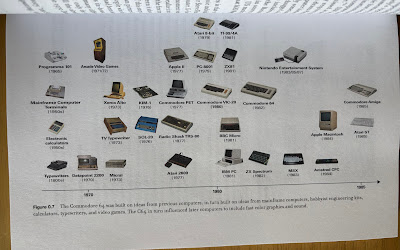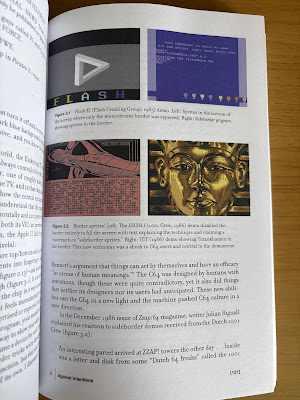The story of how a group of individuals worked against corporate tradition and launched the IBM "Personal Computer" is an interesting tale and one that appeals to the history nerd in me. And since it's from the keyboard of a gentleman who was intrinsically involved with the project (albeit not from the very beginning), this soon resulted in an Amazon order.
Then I read the blurb on the back...
There was going to be a rant, then I thought screw it, it's not worth it, so short review first, then a caveat...
This is a well written and rather detailed account of how the IBM PC's development proceeded, the challenges they faced with construction and marketing, how the plans to develop a successor architecture kind of went off the rails when marketing got hold of it, and how that created the unfortunate link between PS/2 and OS/2. So far so good. There is interesting stuff a-plenty, and it's a good read, even if the author's corporate politics shine through...
Yeah, we get it, you loved your job, but can we please move away from the "your work must control your very lives and you might get a slightly higher wage for losing all your spare time with you family" schtick, for fuck's sake. Much like in Eric Berger's tome on the early days of SpaceX, sure, be committed to your career and achieving goals, but deity on a bicycle, you're only here once (possibly - other Faith's are available, or not, it's your life after all), so live, don't just exist as a wage slave. I know, I know, personal politics and all that, but that kind of expectation from "high achievers" often rolls down hill to the demand that even the lowest staff should drink the corporate Kool-Aid. This, I do not agree with.
Also, Mr Andrews, we get it that IBM's success was of direct benefit to Microsoft. It got them into operating systems, but after that, we are where we are because of Microsoft's business decisions, not IBM's. Even Clippy. And Copilot. Especially Copilot.
Finally, please take your idolisation of the infra-red keyboard and shove it... in a cupboard. They've never worked reliably, they were practically a reason not to buy an Apricot machine in the mid-1980's here in the UK (with many more reasons not to buy Apricots in the US...), and when combined with whatever cheese-induced nightmare decision making process led to the PC Jnr's chicklet keyboard, well, just no. Seriously, as pointed out in my post reviewing Too Much Fun, if the keyboard is the primary, nay only input method for your computer, DO NOT MAKE IT SHIT! There were many worse out there too, but considering the prices IBM were asking for the Jnr in the States...
There's no reason not to buy this book if the subject is of interest, but there is a huge caveat pictured below that you NEED to be aware of in doing so.
I do not like historical revisionism for the sake of self promotion. I can understand why whoever wrote the back cover blurb (whether it was the author or not), tried to pump up the energy about the subject matter, but frankly, dearies, this one is a doozy.
I made similar comments in my review of Too Much Fun about the "Nintendo Saviour" complex there seems to be about the 1980's video games market, which completely ignores the computer gaming side of things and pretty much leans to the concept that without the Nintendo Entertainment System arriving in the US when it did, no one would be playing games on an electronic device these days. That's bullshit, completely ignores the fact that other countries even existed, and wipes out the contributions of the countless thousands who developed hardware and software completely separated from home consoles. Yet the blurb for Too Blue!, backed up by the author's pro-IBM stance, does the very same thing with personal computing.
IBM DID NOT invent personal computers, either for home or business use. They were, however, the only company that could define a business standard for personal computers at that time. They had the sales teams, marketing, and reach to do it, and they did it. But without the clone market, prices of DOS PC's would never have dropped to the point where the average home user could buy one. While all that was happening, there were many companies supplying some highly (and not so highly) capable computers to the average home user, and that seems to have been missed out in this book. Credit where credit is due, but even a cursory glance at the period shows that personal computers were very much a thing before Personal Computers. No amount of corporate flag waving is going to change that.
That is to get into computing history proper, and there is an absolute ton of it about out there, from the perspective of both personal and business users, and whilst you will learn a lot from Too Blue!, it should not be read in isolation, as that history is rich, varied, and there is always something more to discover. That's what makes it so much fun. Anyway, aside from that caveat, it's a good read.
You can pick up a copy of Too Blue! from Amazon.










